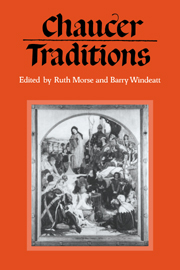Book contents
- Frontmatter
- Contents
- List of contributors
- Preface
- Note on the text
- 1 Chaucer traditions
- 2 Gower–Chaucer's heir?
- 3 Chaucer and Lydgate
- 4 Hoccleve and Chaucer
- 5 Chaucer and fifteenth-century romance: Partonope of Blois
- 6 Some Chaucerian themes in Scottish writers
- 7 The planetary gods in Chaucer and Henryson
- 8 Gavin Douglas: ‘Off Eloquence the flowand balmy strand’
- 9 Skelton's Garlande of Laurell and the Chaucerian tradition
- 10 Chaucerian metre and early Tudor songs
- 11 Aspects of the Chaucerian apocrypha: animadversions on William Thynne's edition of the Plowman's Tale
- 12 The shape-shiftings of the Wife of Bath, 1395–1670
- 13 The genius to improve an invention: transformations of the Knight's Tale
- 14 From the Clerk's Tale to The Winter's Tale
- 15 The Virtuoso's Troilus
- 16 Rewriting romance: Chaucer's and Dryden's Wife of Bath's Tale
- 17 Chaucer's religion and the Chaucer religion
- 18 A list of the published writings of Derek Brewer
- Index
4 - Hoccleve and Chaucer
Published online by Cambridge University Press: 23 September 2009
- Frontmatter
- Contents
- List of contributors
- Preface
- Note on the text
- 1 Chaucer traditions
- 2 Gower–Chaucer's heir?
- 3 Chaucer and Lydgate
- 4 Hoccleve and Chaucer
- 5 Chaucer and fifteenth-century romance: Partonope of Blois
- 6 Some Chaucerian themes in Scottish writers
- 7 The planetary gods in Chaucer and Henryson
- 8 Gavin Douglas: ‘Off Eloquence the flowand balmy strand’
- 9 Skelton's Garlande of Laurell and the Chaucerian tradition
- 10 Chaucerian metre and early Tudor songs
- 11 Aspects of the Chaucerian apocrypha: animadversions on William Thynne's edition of the Plowman's Tale
- 12 The shape-shiftings of the Wife of Bath, 1395–1670
- 13 The genius to improve an invention: transformations of the Knight's Tale
- 14 From the Clerk's Tale to The Winter's Tale
- 15 The Virtuoso's Troilus
- 16 Rewriting romance: Chaucer's and Dryden's Wife of Bath's Tale
- 17 Chaucer's religion and the Chaucer religion
- 18 A list of the published writings of Derek Brewer
- Index
Summary
Some twelve years after Chaucer's death, Thomas Hoccleve paid tribute to the eloquence, wisdom, and piety of his predecessor in three passages of The Regement of Princes. Hoccleve's admiration, he claims, is based upon personal acquaintance; for when, in the Regement prologue, he first reveals his name to the old almsman, the latter's immediate reaction is to identify him as one of those people who knew Chaucer:
‘Hoccleve, sone?’ ‘Iwis, fadir, bat same.’
‘Sone, I have herd or this men speke of be;
bou were aqueynted with Caucher, pardee–
God have his soule best of any wyght!–
(1865–8)Later, Hoccleve recalls how Chaucer was accustomed to help him with ‘consail and reed’:
‘Mi dere maistir – God his soule quyte! –
And fadir Chaucer fayn wolde han me taght;
But I was dul, and lerned lite or naght.’
(2077–9)The apology for dullness is conventional enough; but there are no good reasons to doubt that Hoccleve had, towards the end of the previous century, sat at Chaucer's feet and received from him some kind of instruction in the art of English poetry.
Given this association, it is not surprising that certain of Hoccleve's own poems should have been attracted into the Chaucerian orbit during the fifteenth and sixteenth centuries. Like Chaucer, Hoccleve ‘wroot ful many a lyne’ in praise of the Virgin Mary (Regement, 4987), and two of his eight Marian poems proved capable of being mistaken for the master's.
- Type
- Chapter
- Information
- Chaucer TraditionsStudies in Honour of Derek Brewer, pp. 54 - 61Publisher: Cambridge University PressPrint publication year: 1990
- 1
- Cited by



